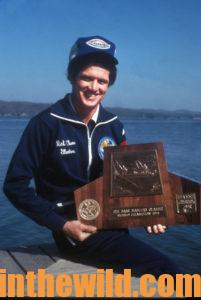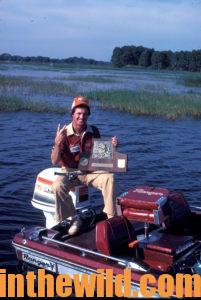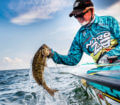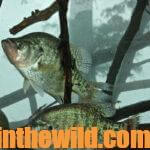 Editor’s Note: Rick Clunn of Ava, Missouri, has won 4 Bassmasters (www.bassmaster.com) Classics (1976, 1977, 1984, and 1990) and has 16 Bassmaster tournament wins, besides national wins on several other bass-fishing tournament circuits. Rick Clunn has been a consummate student of bass and knows bass fishing. Years ago, Rick Clunn told me that he believed in the Oriental philosophy about age – that older people should be revered for their wisdom. Clunn says, “In Oriental cultures, as people get older, they’re seen more and have perfected their crafts. That’s why at 72, I believe my best days of bass fishing are in front of me.” At the Bassmaster’s Elite Tournament on the St. John’s River on February 7-10, 2019, Rick Clunn made the cut to the top 10 who would fish on the last day of the tournament for the championship. That was the good news. However, he’d finished in 8th place and
Editor’s Note: Rick Clunn of Ava, Missouri, has won 4 Bassmasters (www.bassmaster.com) Classics (1976, 1977, 1984, and 1990) and has 16 Bassmaster tournament wins, besides national wins on several other bass-fishing tournament circuits. Rick Clunn has been a consummate student of bass and knows bass fishing. Years ago, Rick Clunn told me that he believed in the Oriental philosophy about age – that older people should be revered for their wisdom. Clunn says, “In Oriental cultures, as people get older, they’re seen more and have perfected their crafts. That’s why at 72, I believe my best days of bass fishing are in front of me.” At the Bassmaster’s Elite Tournament on the St. John’s River on February 7-10, 2019, Rick Clunn made the cut to the top 10 who would fish on the last day of the tournament for the championship. That was the good news. However, he’d finished in 8th place and
was 11 pounds behind the 1st place finisher at the beginning of the day.If you look at Rick Clunn’s total winnings on the BASS circuit, you’ll see that he’s earned more than $2 million+ in bass fishing. However, in the beginnings of tournament bass fishing, quite a few other organizations also held tournaments and championships. Clunn’s total winnings are probably over $3 million, if not more. Back in the early days of tournament bass fishing, tournaments didn’t pay nearly as much for winning as they do today. In years past, Clunn won the Red Man All American, a $100,000 tournament, the American Classic, a $200,000 bass-fishing tournament, and some opens on the other circuits paying $50,000 for a win. Clunn won four Bassmaster Classics, and the most money he ever received from any one of those Classics was $40,000, although today, Classics pay $300,000 per win.
Clunn also has been an innovator in the realm of intuitive thinking while fishing. Today’s competitive
angler uses words like, “trusting my gut, a voice from God, a phenomenon I can’t explain, or a feeling that I had,” to try to explain why they used a lure they’d never fished before, went to a place they’d never fished before, or made some type of adjustment in their fishing that defied reason. Yet this strange sensation caused them to finish higher or to win a tournament with no clear explanation for why they’d won. At first, some saw Rick as a crackpot, a guy who believed in some very far-out religions, or who was just weird. However, Clunn’s been right so many times, they have had to readjust their thinking and also rely more on their intuition to direct them to the places they fish and the lures they use.
When asked about how he learned to fish intuitively, Clunn replied, “Intuitive fishing happens naturally, or at least it does at first. Once you realize something’s going on that’s helping you become a better angler, you want to find out what’s happening and put a label on it. As you begin to research how these things occur, you see that there are some things you can’t always explain from an intellectual standpoint. When one of these phenomena occurs, anglers often gloss over it because they may not understand it, or they may give it a label like, “Trusting your gut.”
“All of us get an intellectual education for 12 to 20 years of our lives, and having an intellectual education means you should be able to explain away anything that happens to you. But the fishing world is different from the intellectual world. You’re constantly learning every day, every hour and every minute you’re on the water. And, you’re storing vast amounts of information that you often forget in that wonderful computer called a brain.
 “I once read an article about Albert Einstein. He said, ‘All my theories of relativity and discoveries in physics did not come from my rational mind.’ I realized that Einstein’s theories were totally new and different from anything that had been learned in the past. There was no intellectual background for some of those discoveries that he made, and if you put all your fishing experience into that computer-like brain of yours, you intellectually could explain why you did the things that made you successful. You have to recognize there’s another form of knowledge that defies definition. Anglers often call it a ‘Gut feeling.’ Fishermen have known for a long while that to be consistently successful, they have to have current knowledge of fishing conditions as they change throughout a day of fishing.
“I once read an article about Albert Einstein. He said, ‘All my theories of relativity and discoveries in physics did not come from my rational mind.’ I realized that Einstein’s theories were totally new and different from anything that had been learned in the past. There was no intellectual background for some of those discoveries that he made, and if you put all your fishing experience into that computer-like brain of yours, you intellectually could explain why you did the things that made you successful. You have to recognize there’s another form of knowledge that defies definition. Anglers often call it a ‘Gut feeling.’ Fishermen have known for a long while that to be consistently successful, they have to have current knowledge of fishing conditions as they change throughout a day of fishing.
“If the BASS circuit returns to the St. John’s River next year, the worst thing I could do would be to try to duplicate the same pattern I used to fish when I won, because the conditions would have changed. The past is always the past, and it has very little influence on the present because it’s not current. The only

thing that can give you current information is intuition, or, ‘Fishing in the moment.’ So, the next question is, where does intuition come from, and although there’s no science involved in my conclusion, I believe intuition comes from using all your senses to the highest degree possible. For example, when you’re on the water fishing, you’re trying to think with your brain, ‘What’s the water condition? What’s the weather condition? Where should the bass be?’ Your brain is evaluating all those questions and coming up with answers. And, I believe that your intuition can make all those calculations faster than your brain can and oftentimes come up with better answers than you can intellectually.
“There’s two contradictory problem solvers working at the same time – your ego and your intellect. The ego and the intellect are best friends, but each one wants to be in control. If you make straight As in school, then your ego says, ‘You need to be in control because you’ve made good grades, and you’re really smart.’ Then when a third party enters in (between the ego and the intellect) and says, ‘You’re wrong, you need to start doing this,’ those two parts of who you are get mad at each other. They try to rationalize what they think you need to do. Therefore, your ego and your intellect try to fool you and say, ‘Intuition is trying to fool you; listen to us.’
 “I’ve only seen one clear factor that exposes ego and intellect, and that’s fear. Ego and intellect will tell you that an intuitive thought isn’t an intuitive thought, and that the fear of being wrong often causes us not to listen to the intuitive. The only time I can determine what is a true, intuitive feeling or suggestion is when there’s no fear tied to that thought. When I know I don’t care what people think about a decision I make, and I don’t fear being wrong, that’s when I can act on that intuition.
“I’ve only seen one clear factor that exposes ego and intellect, and that’s fear. Ego and intellect will tell you that an intuitive thought isn’t an intuitive thought, and that the fear of being wrong often causes us not to listen to the intuitive. The only time I can determine what is a true, intuitive feeling or suggestion is when there’s no fear tied to that thought. When I know I don’t care what people think about a decision I make, and I don’t fear being wrong, that’s when I can act on that intuition.
“For instance, if there are coves, I go to the first one, I make 10 casts, and then I get an intuitive thought to leave and go fish in that last cove, do I fear that someone’s going to fish this cove where I’ve started fishing? Am I afraid that if I don’t go to that last cove that someone will get that spot? Instead of leaving immediately and going to that cove, that’s where fear blocks intuition. Intuition doesn’t care about fear. It’s an impulse that fishermen react to in an instant, and it’s not always right, but it’s right enough times that I use it in my fishing.”
For more information on Rick Clunn, go to his Facebook page: (www.facebook.com/rick.clunn)
To learn more about bass fishing check out John E. Phillip’s book, “Winning Strategies of the Bass Pros,” available in Kindle, print and Audible versions at https://amzn.to/2WKm6gj
Tomorrow: 72 year-old Rick Clunn Feels Like He’s 29 When Bass Fishing










